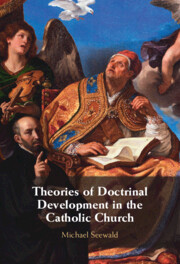Book contents
- Theories of Doctrinal Development in the Catholic Church
- Theories of Doctrinal Development in the Catholic Church
- Copyright page
- Contents
- Acknowledgements
- Introduction: What Is This Book About?
- 1 Defining Dogma and Development
- 2 The Bible: Both Product and Yardstick of Doctrinal Development
- 3 How the Early Church Reflected on Doctrinal Continuity and Change
- 4 Discussions in the Middle Ages on Changes to the Unchanging Faith
- 5 Theories of Doctrinal Development in the Nineteenth and Early Twentieth Century
- 6 The Twentieth Century: From Anti-Modernism to the Second Vatican Council
- 7 Overview and Outlook
- Epilogue: An ‘Obituary’ to the Church?
- Bibliography
- Index
1 - Defining Dogma and Development
Published online by Cambridge University Press: 18 February 2023
- Theories of Doctrinal Development in the Catholic Church
- Theories of Doctrinal Development in the Catholic Church
- Copyright page
- Contents
- Acknowledgements
- Introduction: What Is This Book About?
- 1 Defining Dogma and Development
- 2 The Bible: Both Product and Yardstick of Doctrinal Development
- 3 How the Early Church Reflected on Doctrinal Continuity and Change
- 4 Discussions in the Middle Ages on Changes to the Unchanging Faith
- 5 Theories of Doctrinal Development in the Nineteenth and Early Twentieth Century
- 6 The Twentieth Century: From Anti-Modernism to the Second Vatican Council
- 7 Overview and Outlook
- Epilogue: An ‘Obituary’ to the Church?
- Bibliography
- Index
Summary
Without clear concepts, every discussion is bound to remain vague. This is a trivial observation. However, it is difficult to determine what role the history of a concept plays in its definition, since, whereas every definition aims for the greatest possible clarity, investigating the history of a concept often relativizes (if not undermines) such clarity. We could use an intensional definition and identify all the properties of the objects to which the term dogma applies; or we could use an extensional definition and look at all the objects that fall under the definition of ‘dogma’. The result of doing so would at best be a synchronous clarity that nonetheless conceals a diachronic ambiguity arising from the fact that the concept of dogma has not always been used in the theological context in the same way that it is used today. This is true for most of our concepts, and this is again a trivial observation. But, when it comes to the concept of dogma, the insight is also revealing, since, in its narrowest sense, the concept denotes a final and ‘irreformable’ (Denzinger, No. 3074) doctrine, while at the same time being itself the result of processes of change. Looking at the history of concepts therefore complicates theological reflection, but also prevents us from falling into the trap of underestimating the complexity of its themes.
- Type
- Chapter
- Information
- Publisher: Cambridge University PressPrint publication year: 2023



